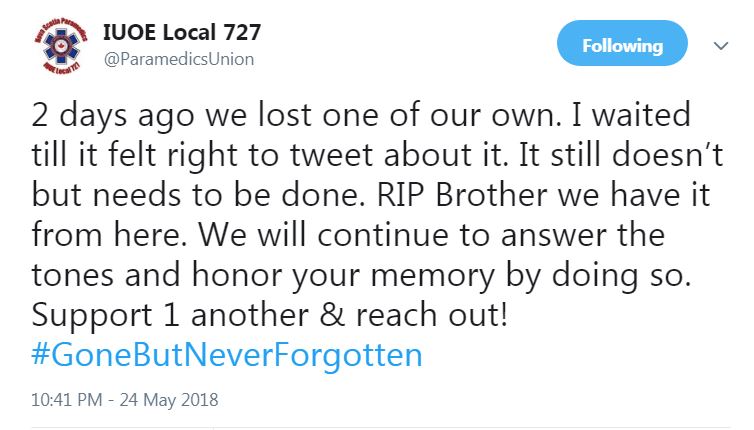The Nova Scotia paramedic community is mourning the loss of one of their own.

Veteran paramedic, Scott Barteaux, “passed away suddenly” on May 23.
According to his obituary, the father and husband served as a paramedic for 23 years.
The provincial union representing paramedics tweeted out their condolences in part saying, “RIP Brother, we have it from here.”
READ MORE: PTSD, suicide and first responders — A lot of talk, and not much progress
Their tweet also urged first responders to support one another and reach out if they need help.
Barteaux’s death is prompting renewed discussion on the need for improved access to supports for first responders who suffer from PTSD and other mental illnesses caused by their job.

Get weekly health news
“PTSD to us, shouldn’t be any different than falling down and breaking your leg. If you fall down and break your leg you go to the ER, a doctor signs a note and says you have a broken bone, WCB says oh you have a broken bone, here’s your claim,” Terry Chapman said, the CEO of the Nova Scotia Paramedics Union.
WATCH: Former first responder receives national award for PTSD podcast

Last fall, amendments were made to the Worker’s Compensation Act to “improve access to PTSD benefits”.
Before, workers had to prove their PTSD claim was directly connected to a workplace incident.
The new changes presume the illness is caused by the working environment.
While Chapman says the amendments are “positive to a point”, he still has concerns over the processing period PTSD claims take.
“Because of the lack of listed physicians who WCB will recognize, our members and some have actually told us, that they may feel they need help but they don’t want to go there because first of all they’ll be requested to file claim, they may be taken off work for whatever reason and during that time there could be an appeal, there could be a rejection of it, there’s no quick cut and dry system to help them,” he said.
The amendments come into effect this fall.

_TOR1CIAA_1_848x480_1243375171693.jpg?w=1040&quality=70&strip=all)







Comments
Want to discuss? Please read our Commenting Policy first.